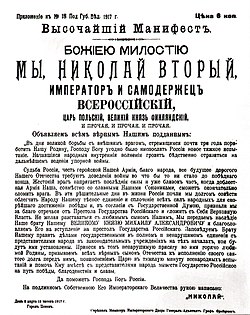You can help expand this article with text translated from the corresponding article in Russian. (May 2019)Click [show] for important translation instructions.
|




Emperor Nicholas II abdicated the throne of the Russian Empire on 2 March (O.S.) / 15 March (N.S.) 1917, in the Russian city of Pskov, in the midst of World War I and the February Revolution. The Emperor renounced the throne on behalf of himself and his son, Tsarevich Alexei Nikolaevich, in favor of his brother Grand Duke Michael Alexandrovich. [1] The next day the Grand Duke refused to accept the imperial authority, [1] stating that he would accept it only if that was the consensus of democratic action by the Russian Constituent Assembly, which shall define the form of government for Russia. [2] With this decision, the rule of the 300-year-old House of Romanov ended. [3] Power in Russia then passed to the Russian Provisional Government, signaling victory for the February Revolution.